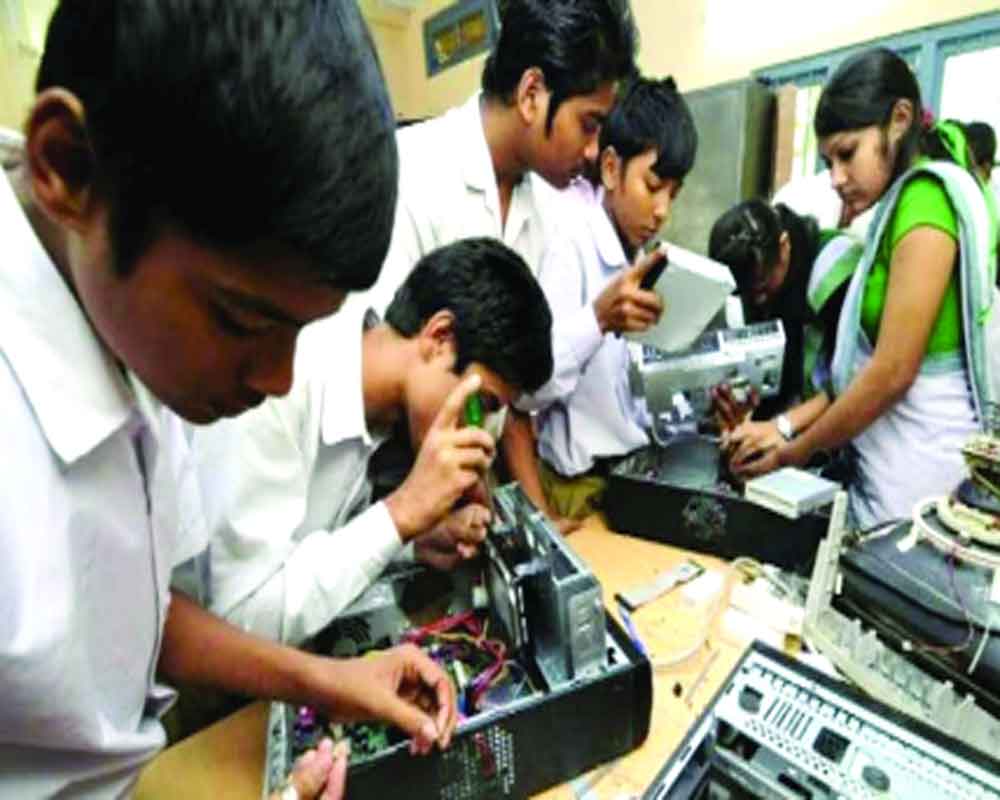Skill-based education is paramount to bridging the gap between potential and realisation in a job market increasingly favouring specialised technical skills
In today's rapidly changing job market, skills development is of paramount importance. The job market is constantly evolving due to technological advancements, economic developments, and shifting client preferences. To excel in this dynamic environment, people must adapt and develop new abilities.
The future of work will not only revolve around hard skills but also encompass holistic skills. India, with over 808 million young workers below the age of 35, needs to reflect seriously on the correlation between skills and employability, potential versus realization, and ambition versus support. The current skill deficit of only 5% being formally skilled, and a focus on formal learning, leaves graduates unprepared for the competitive job market. Therefore, the shift towards holistic skill-based education, as outlined in National Education Policy 2020, is imperative for success.
The primary goal of skill development is to enhance sustainable employability, transition unskilled workers into formal employment, and improve job quality and livelihoods. The evolving job market demands skills that align with business productivity. The impending job landscape in India requires a blend of advanced technical skills and softer, transferable skills. It is crucial to provide early exposure to these skills during high school to ensure that young individuals are adequately prepared for the future job market.
According to a World Economic Forum report, by 2027, 69 million new jobs will be created, while 83 million will be eliminated. The era of generalists is giving way to an era of specialists. The next few years will witness significant demand for Artificial Intelligence (AI) professionals, sustainability specialists, business intelligence analysts, and information security specialists.
In today's highly competitive job market, there are still plenty of opportunities for those with the right skills. To stay ahead of the competition, even many traditional skill-based businesses are now actively seeking out AI and automation experts.
Professions are being transformed by automation and artificial intelligence, with certain jobs becoming obsolete and new opportunities emerging in growing industries. As machines take over repetitive tasks, there is now a greater demand for specialized technical skills. Currently, data science, artificial intelligence, robotics, and machine learning are the leading job creators. This means that job seekers must possess a different set of skills to remain competitive.
Today, technology and digital literacy skills are essential for most employment roles. Programming languages, data analysis, cloud computing, and cyber security expertise are critical as data-driven businesses must protect their data from cyber threats.
Moreover, in this digital age, soft skills are more crucial than ever. Communication skills, problem-solving, creativity, and critical thinking are all essential to navigating an automated world successfully.
Those who can combine technical skills with these soft skills will have a significant advantage in today's job market.
In the current Asian job market, candidates with adaptable skills are the most sought-after. Employers demand individuals who can rapidly acquire new skills and apply them effectively in a dynamic work environment. Given the dynamic nature of the job market, many job roles become obsolete over time, and new ones emerge.
Therefore, adaptability and the ability to reskill and upskill have become highly valued and critical for both employees and employers to remain competitive and relevant.
As technology continues to reshape job creation and the implementation of AI and automation, deep data analytics across functions are driving these changes. The introduction of new technologies has compelled businesses to reskill their workforce. With over 54% of India's workforce requiring reskilling, traditional jobs in manufacturing, administration, and retail become obsolete due to automation, and the workforce in these fields must reskill to find new opportunities.
Upskilling, on the other hand, is the process of enhancing existing abilities to meet the changing needs of a job function to be more effective and reliable. Hence, a salesperson, for example, may need to upskill in digital marketing to remain competitive.
Sustainable Employability: Lifelong learning is an absolute necessity for adapting to the ever-evolving job market. It is imperative to understand that learning should not be confined to formal education, as it holds greater significance than ever before. Continuous learning is the key to remaining employable and excelling in a career.
Furthermore, businesses highly value individuals who can embrace change and seek out new learning opportunities. Adopting a mindset of constant improvement is an invaluable asset in a job market that values adaptation and creativity. Additionally, lifelong learning can significantly improve an individual's job satisfaction and overall well-being. It is the prime responsibility of individuals to take charge of their skill development and always adapt to the changing landscape of today's job market.
As India approaches a transformative era, rethinking education and prioritizing on-the-job training are crucial.
Embracing apprenticeships can shape a workforce equipped not only with theoretical knowledge but also practical tech-based skills, essential for gaining a competitive edge and thriving in the dynamic economic landscape. Lifelong learning is paramount in adapting to the evolving job market, where adaptability and creativity are highly valued. Individuals must take charge of their skill development to remain employable and excel in their careers. The future of work demands a blend of technical proficiency and soft skills, underscoring the necessity for continuous self-improvement and adaptation.
In conclusion, as India stands on the brink of an era of transformation, it is vital to rethink education, give priority to on-the-job training, and embrace apprenticeships to shape a workforce that not only possesses theoretical knowledge but also has the practical tech-based skills necessary to gain a competitive advantage and thrive in the dynamic landscape of the country's economy.
(The writer is a Co-Founder and MD of Orane International, a Training Partner with the National Skill Development Corporation (NSDC), and a Network Member of India International Skill Centres (an initiative of GoI). Views are personal)


























